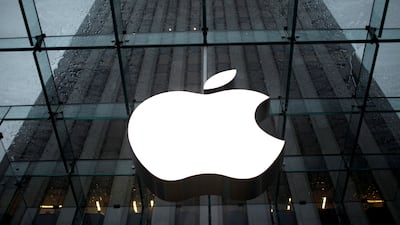Apple's stock-market value briefly rose above $3 trillion on Monday, shattering yet another record and underscoring how the Covid-19 pandemic has turbocharged Big Tech’s decades-long rise.
The company was the first to achieve this milestone, although it failed to hold above the level until the end of the trading day. It closed 2.5 per cent higher at $182.01 and was flat in after-hours trading, with a market capitalisation of $2.99tn. The advance came on a broadly positive session for stocks, where Apple and Amazon both contributed to the Nasdaq 100 Index outperforming.
The iPhone maker also set a record in midday trading when its shares rose to $182.88.
"It's a fantastic accomplishment and certainly worthy to be celebrated," said Jake Dollarhide, chief executive of Longbow Asset Management. "It just shows you how far Apple has come and how dominant it is seen as in the majority of investors' eyes."
The world's most valuable company is the first to reach the milestone as investors bet that consumers will continue to shell out top dollar for iPhones, MacBooks and services such as Apple TV and Apple Music.
The unprecedented demand for tech devices and services played a huge role in the success of Apple, one of the few companies that emerged a winner during the pandemic and posted impressive financial results. Apple's revenue rose 47 per cent from the previous year during its last quarter.
Its shares have jumped 38 per cent since the beginning of 2021. As it accounts for a significant percentage of holdings for major indices, Apple's gains have mirrored those of the broader market during a time of economic and technological change, according to Investopedia.
Apple, though, wasn't spared by the chip shortage last year, which delayed the manufacturing and release of a number of its products, including its iPhone 12 series. But investors have brushed off these concerns.
"The market is rewarding companies that have strong fundamentals and balance sheets, and the companies that are hitting these sort of huge market caps have proven they are strong businesses and not speculation,” said Scott Wren, senior global market strategist at Wells Fargo Investment Institute.
Apple's march from $2tn to $3tn in market value took about 16 months. At present, it is only one of six companies in the highly-elite trillion-dollar market cap club, alongside Microsoft, Alphabet-owner Google, Saudi Aramco, Amazon and Tesla.
Meanwhile, the broader market was set to extend a recovery from the pandemic shock, led by Tesla and followed by Apple and Nvidia.
Analysts expect that Apple's future product launches could further buoy its performance.
Recently, Morgan Stanley analyst Katy Huberty bumped the company's price target on Apple shares to $200 from $164, saying that analysts have failed to price in the impact of future product releases and particularly its augmented and virtual reality products. Demand for iPhones is expected to remain strong in 2022, as Apple leads China's smartphone market and more consumers subscribe its services.
Apple's shares have climbed around 5,800 per cent since co-founder and former chief executive Steve Jobs unveiled the first iPhone in January 2007, far outpacing the S&P 500's gain of about 230 per cent during the same period.
Under Tim Cook, who became chief executive in 2011 following Jobs's death, Apple has sharply increased its revenue from services like video streaming and music.
The diversification has helped the company reduce its reliance on the iPhone, which accounted for just about 52 per cent of its total revenue in fiscal 2021 from more than 60 per cent in 2018. This soothed investors who were worried that the company relied too much on its top-selling product.


